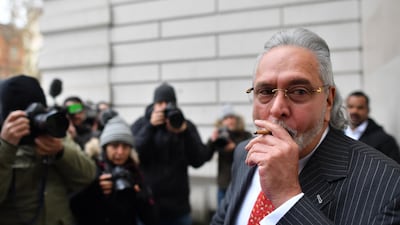Britain is the destination of choice for Indian fugitives after three decades of extradition efforts that resulted in just three people returning to face justice, according to a study of high-profile cases.
Business and family ties, the two countries' historic connections and a property industry that lends itself to anonymous purchases all contributed to London becoming a bolthole for suspects wanted by New Delhi, said the author of a new book charting India's chequered history in the British courts.
Courtroom successes against prominent businessmen Vijay Mallya, the former airline boss, and jeweller to the stars Nirav Modi, suggest that prosecutors in Delhi have upped their game, Danish Khan said.
Despite courts finding that the two wealthy men must stand trial in India on charges of money laundering and fraud targeting state banks, they remain in the UK as they explore all legal avenues to prevent their return.
A string of failures also highlighted how the UK is still considered a safe bet for alleged economic criminals wanted by the Indian government of Prime Minister Narendra Modi.
Delays and errors in filed documents and the refusal by British courts to return suspects on human rights grounds frustrated Indian authorities.
“You can literally count on the fingers of one hand in the last two to three decades the people who have returned to India,” said Mr Khan, a London-based historian and journalist.
The two countries signed an extradition treaty in 1992 but it took more than two decades before the first person was returned under the agreement.
Samirbhai Vinubhai Patel was sent to India in 2016 to stand trial for murder, accused of being part of a mob that attacked Muslims in riots in the western state of Gujarat in 2002.
Since then, only two other men were returned. Sanjeev Chawla was allegedly involved in a cricket match-fixing racket, while Kishan Singh was sent back last month accused of running a drugs operation.

But the major scalp of one of the country’s most prominent businessmen remains out of reach as Mr Mallya seeks political asylum and Mr Modi has yet to exhaust the appeals process.
Mr Mallya – the flamboyant self-styled King of Good Times – fled to the UK in 2016 as his Kingfisher airline collapsed. He has fought removal from the country since his arrest four years ago.
Prime Minister Modi had been under intense pressure to secure the return of the former Formula One motor racing boss, one of more than 30 Indians linked to fraud cases who fled the country to avoid prosecution.
"What has happened in the Nirav Modi and Vijay Mallya cases is the paperwork from India is definitely better and more thorough," Mr Khan said. "There has been so much public pressure because the issue became a symbol of bad capitalism.

“So many extradition cases just collapsed because of small procedural issues. That hasn’t really stopped, but we saw a different and more determined effort in terms of Vijay Mallya and Nirav Modi.”
Mr Khan cited the case of London couple Arti Dhir and Kaval Raijada, who were wanted in India, accused of having their adopted son killed for an insurance payout. Judges rejected the extradition on human rights grounds because the potential penalty was life in prison, without the prospect they could ever be freed.
Prosecutors from the two countries also clashed over the failure to extradite a British paedophile accused of abusing orphans in the 1980s and 1990s in Goa.
Raymond Varley won his battle against extradition in 2014 after a UK judge ruled he was suffering from dementia and his return would be oppressive.
Despite the setbacks, India has a number of cases in the pipeline, Mr Khan said. They include the first wife and two sons of Iqbal Memon, a businessman named as one of the world's biggest drug dealers.
Memon was the reputed London-based fixer for Dawood Ibrahim, one of the world's most wanted criminals-turned-terrorists and the suspected mastermind behind bombings in 1993 on the Mumbai stock exchange.
Memon died from a suspected heart attack in Britain in 2013 after defying two decades of efforts by India to put him on trial. Shortly before he died, Memon told the UK's Independent newspaper that the description of him as a kingpin of a cricket match-fixing syndicate was preposterous and claimed that he was a successful businessman who was constantly harassed.
Escaped: True stories of Indian fugitives in London by Danish and Ruhi Khan is published by Penguin Random House

